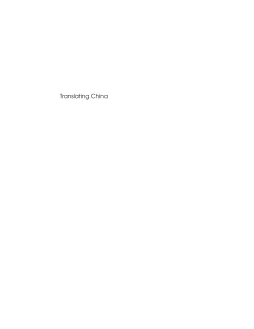
Additional Information
Book Details
Abstract
Translation has been instrumental in opening the door between China and the rest of the world from ancient times to the present day, and has helped facilitate cultural exchange and the sharing of knowledge. This book makes and important contribution to the study of translation into and from Chinese. A wide range of topics are covered, such as Chinese canonization of Buddhism, Chinese cultural identity and authenticity in translation, Chinese poetry, opera, politics and ideology in translation, and the individual contributions made by translators to modernity and globalisation. The analyses and arguments offered by the authors make this book a must read for anyone interested in translation from a Chinese perspective.
This book provides a wealth of information on how modern Chinese translation evolves from a unique tradition of its own, through mediation with both source texts and target texts and through literary and religious works over the centuries. It not only analyzes a number of questions regarding translation in China from multiple perspectives, but also helps the reader better understand the relationship between cultural translation and the phenomenon of Chinese modernity.
For readers who are interested in China, the book promises interesting and thought-provoking reading. The subject matter discussed in the book ranges from philosophy to translation, including matters of historical, religious, social and ideological interests. Contributors are well-known scholars from China, Hong Kong, and Taiwan. Their understanding of matters related to China will provide valuable insight for any one who wishes to "interpret China."
Luo Xuanmin is Professor at the Department of Foreign Languages and Literature, and Director of the Center for Translation and Interdisciplinary Studies, Tsinghua University, Beijing. His publications include books, translations and articles in various presses and journals at home and abroad. He is the founding editor of the journal Foreign Languages and Translation, chief editor of Abstracts of Chinese Translation Studies, and is on the advisory/ editorial board for several journals. He was twice Visiting Fellow at Yaleâ??s Comparative Literature Department (1995-1995, 2001) and Fulbright Research Scholar at UCLA (2006-2007). He is now Vice President of the Chinese Association of Comparative Studies in English and Chinese (CACSSEC), and Deputy Secretary-General of the Translation Association of China (TAC).
He Yuanjian is Professor at the Department of Translation, the Chinese University of Hong Kong. He is author and co-author of three books on Chinese generative grammar (1996, 2001, 2002) and author and co-author of more than 40 research papers published on translation studies, language typology, and Chinese linguistics
The book analyze the most relevant questions on translation in China, by using a wise mix of Western and Chinese approaches; the result is a clear picture of how China in various ages and in many fields has encountered the world.
Applying concepts current in Western translation studies, these erudite essays by leading Chinese scholars provide important insights into the history and present-day practice of translation in China.
Table of Contents
| Section Title | Page | Action | Price |
|---|---|---|---|
| Contents | v | ||
| Acknowledgements | vii | ||
| Contributors | ix | ||
| Introduction | 1 | ||
| Chapter 1 Cultural and Historical Perspectives on Translation in China | 13 | ||
| Chapter 2 Chinese Translation of Buddhist Terminology: Language and Culture | 39 | ||
| Chapter 3 Transformer Sinicized and the Making of Chinese Buddhist Parlance | 52 | ||
| Chapter 4 The Art of Misreading: An Analysis of the Jesuit ‘Fables’ in Late Ming China | 71 | ||
| Chapter 5 The Cultural Politics of Translating Kunqu, the National Heritage | 95 | ||
| Chapter 6 Cooperative Translation Models: Rediscovering Ezra Pound’s Approach to Classical Chinese Poetry | 110 | ||
| Chapter 7 Ideology and Literary Translation: A Brief Discussion on Liang Qi-chao’s Translation Practice | 124 | ||
| Chapter 8 Translating Modernity Towards Translating China | 135 | ||
| Chapter 9 ‘Authenticity’ and Foreignizing Translation | 157 | ||
| Chapter 10 Representation, Intervention and Mediation: A Translation Anthologist’s Reflections on the Complexities of Translating China | 171 | ||
| Chapter 11 Translating for the Future: Some Reflections on Making A Dictionary of Translation Technology | 189 | ||
| Chapter 12 Translating Alien Sources from and into Chinese: What does the Translator do, and why? | 207 | ||
| Index | 233 |
